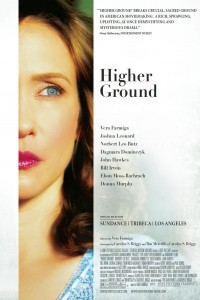Interview: Vera Farmiga of ‘Higher Ground’
Posted on August 24, 2011 at 3:48 pm
Vera Farmiga (“The Departed,” “Up in the Air”) directed and stars in a new film based on the memoir by Carolyn S. Briggs, Higher Ground: A Memoir of Salvation Found and Lost. As she spoke to a small group of reporters in a Georgetown hotel, it was clear that she shares her character’s passionate yearning for an intimate connection with the Almighty.
I began by asking her about her character’s hair, which seems to reflect not just the changing fashions over the decades covered in the film, but her spiritual and emotional state as well. “It was three different time periods. The church changes. It goes from worshipping outside to worshipping in basements, hallways, annexes, to a proper, steeple-topped church. As the hippies turn into yuppies, so do the hairstyles. Her hair starts off wild and carefree and long and tangled. And passionate. And then there are the trials and tribulations and ebbs and flows of her path, and she engages in spiritual warfare and her hair also has its phases. Childbirth, and then she gets shorter. We did a perm curl – it gets corrupted. It gets poisoned — by a home perm! And then by the end it’s a looser wave, gentler.”
 She admitted that this book was an unusual choice for her debut as a director. “It chose me. I really feel that way. I tried to wriggle out of its grasp, several times. Every time I tried, something else would happen that made it unstoppable….It touched me in divinely mysterious ways. It slayed me in the spirit. I loved this woman’s yearning to be passionate in her faith and all her relationships. That yearning is such a holiness to me that it touched me in a very deep way. I wanted to defend her journey….It was so juicy to me….I had a lot of ideas I wanted to bring into the film, ideas about music and praise and worship and joy.” It began to come together when her mentor, Deborah Granick, agreed to advise her and John Hawkes (from Granick’s “Winter’s Bone” agreed to appear in the film. “Before I knew it, I was on the set, having to deliver the last speech first.” And after that, she relaxed and enjoyed it.
She admitted that this book was an unusual choice for her debut as a director. “It chose me. I really feel that way. I tried to wriggle out of its grasp, several times. Every time I tried, something else would happen that made it unstoppable….It touched me in divinely mysterious ways. It slayed me in the spirit. I loved this woman’s yearning to be passionate in her faith and all her relationships. That yearning is such a holiness to me that it touched me in a very deep way. I wanted to defend her journey….It was so juicy to me….I had a lot of ideas I wanted to bring into the film, ideas about music and praise and worship and joy.” It began to come together when her mentor, Deborah Granick, agreed to advise her and John Hawkes (from Granick’s “Winter’s Bone” agreed to appear in the film. “Before I knew it, I was on the set, having to deliver the last speech first.” And after that, she relaxed and enjoyed it.
“A story about God tends to make people tremble,” she said, “as the Almighty should. We all have our personal concepts of that that means. But that three-letter word makes people quake, especially in Hollywood.” But she had the support of her producers (including her husband) who “totally vibed with my vision, no mockery or judgment, just to look at how arduous that spiritual road is, how bumpy. No matter what your religion is, what your spiritual tenets are, what your idea of God is, we’re all on the same human team, trying to transcend self and look upwards for healing and holiness.”
She spoke of learning from directors like Granik, Anthony Minghella, and Martin Scorsese about the spirit they bring to their work, “their leadership, their approach, their wholesomeness, their joy, the good cheer that they spread as they attack their missions. In order for it to be a ‘holy experience,’ everyone’s got to be invested. You have to treat them like kings and queens and show them you are truly grateful.”
Farmiga cast her real-life sister as the younger version of her character. “We have the benefit of genetic similarity, so we did not have to do much as far as matching our performances. We move in similar ways because of the house we grew up in, probably even the Ukranian folk-dancing!”
I asked her about the portrayal of the main character’s friendship in the film. “I’ve learned so much from my best friends and they demand so much of me and inspire me in the ways that make me me. The character is able to be her best carnal self and her best spiritual self because of her friendship with Annika. We wanted to make it the most passionate and pure relationship — and then it gets taken away so she can find it within herself, the same energy, the same approach with the rest of her relationships, including her relationship with God.”
The tone of the film is respectful of all of its characters and their journeys. “My heart and my intent, indigenous to my personality is not cynicism, but compassion and serenity and gentleness and respect. I’m curious, what draws me into a story is recognizing my humanity, my imperfections, telling a story about struggle. This is not a general statement about Christianity; this is a moment this woman found herself in. We are still finding our voices.”
